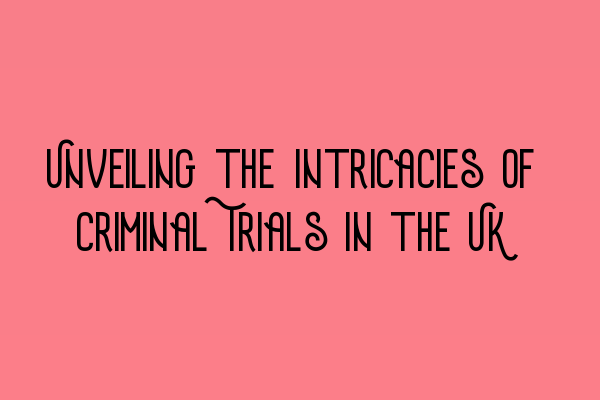Unveiling the Intricacies of Criminal Trials in the UK
Welcome to SQE Criminal Law & Practice Law UK! As solicitors, writers, and SEO experts, we are dedicated to providing you with comprehensive information about the legal system in the United Kingdom. In this blog post, we will delve into the intricacies of criminal trials, shedding light on the process, important considerations, and the role of legal representation.
The Criminal Trial Process in the UK
A criminal trial in the UK follows a well-defined process that ensures the fair administration of justice. It typically includes several key stages:
- Investigation: Before a trial can take place, the police and other relevant authorities conduct a thorough investigation to gather evidence and establish the facts of the case. This may involve collecting witness statements, examining physical evidence, and interviewing suspects.
- Charging: Once the investigation is complete, if there is sufficient evidence, the prosecuting authority can decide to charge the suspect with a criminal offense. The specific offense will depend on the circumstances of the case.
- First Appearance: The accused is brought before a magistrate in the first court appearance. The magistrate informs the accused of the charges and determines bail conditions while awaiting the trial.
- Plea: During the plea hearing, the accused has the opportunity to enter a plea of guilty or not guilty. If a guilty plea is entered, the case proceeds to sentencing. If a not guilty plea is entered, the case proceeds to trial.
- Trial: The trial is the central part of the criminal justice process. It takes place in a Crown Court and involves the presentation of evidence by the prosecution and the defense. The judge or jury then assesses the evidence and decides on the guilt or innocence of the accused.
- Sentencing: If the accused is found guilty, the judge determines the appropriate sentence, taking into account various factors such as the severity of the offense and the personal circumstances of the defendant.
- Appeal: In some cases, either the prosecution or the defense may choose to appeal the verdict or sentence. The appeal process allows for a review of the trial to ensure that there were no errors in law or procedure.
It is crucial to understand that each case is unique and may involve additional steps or considerations. Seeking professional legal advice is essential to navigate the complexities of the criminal trial process.
The Role of Legal Representation
Legal representation plays a vital role in criminal trials in the UK. A skilled and experienced criminal defense solicitor can provide invaluable support and guidance throughout the process. They have in-depth knowledge of the law, courtroom procedures, and the ability to protect the rights of their clients.
In many cases, individuals facing criminal charges are entitled to legal aid, which provides funding for legal representation. However, in some situations, individuals may choose to hire private solicitors or barristers to ensure the highest level of expertise and personalized attention.
Legal representation involves various tasks, including:
- Case Preparation: Solicitors meticulously examine the evidence, identify potential weaknesses in the prosecution’s case, and gather supporting evidence for the defense. They may also interview witnesses and consult with relevant experts.
- Legal Advice: Solicitors advise their clients on the plea options, the potential consequences of each decision, and the strengths and weaknesses of the case. They inform their clients of their rights and help them make informed decisions throughout the trial.
- Advocacy: Solicitors represent their clients in court, presenting legal arguments, cross-examining witnesses, and challenging the prosecution’s evidence. They use their advocacy skills to present the strongest possible case on behalf of their clients.
- Negotiation: Solicitors may engage in negotiation with the prosecution to explore the possibility of reducing charges or securing a more favorable outcome for their clients.
Having competent and dedicated legal representation is crucial to ensure a fair trial and protect your legal rights. At SQE Criminal Law & Practice Law UK, we understand the complexities of criminal trials and the importance of skilled legal assistance.
Conclusion
Criminal trials in the UK involve a well-defined process that aims to ensure fairness and justice. From the initial investigation to the final verdict, every step requires careful consideration and legal expertise. Legal representation plays a vital role in safeguarding the rights of the accused and ensuring a robust defense.
If you require legal assistance or want to learn more about criminal trials in the UK, please do not hesitate to contact us. Our team of dedicated solicitors is here to help you navigate the intricacies of the criminal justice system and provide you with the support you need.
